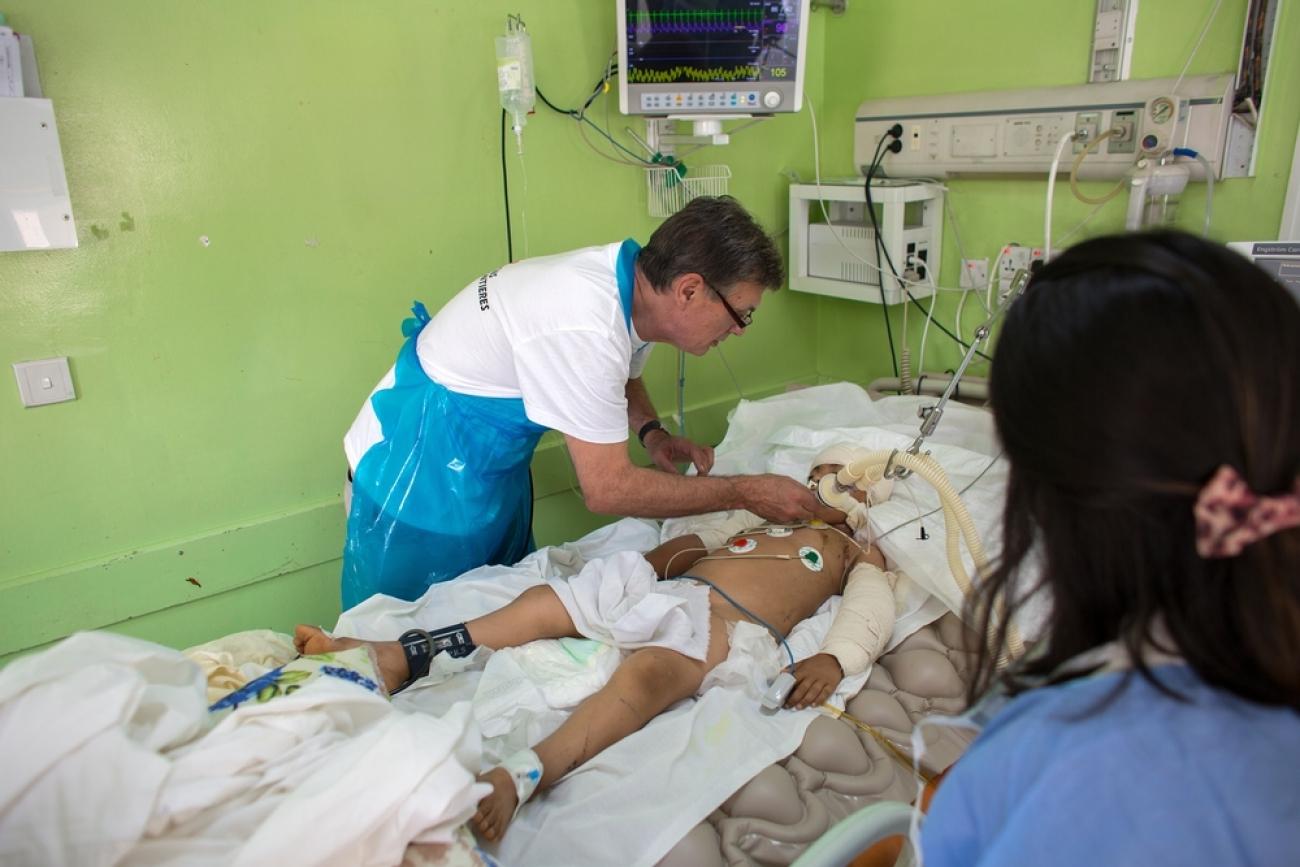
Profile
DIPLOMA
- has a doctorate in medicine with significant experience in the critical care unit (CCU) and/or intensive care unit (ICU)
- good clinical skills, able to adapt to low resource settings and a population with multiple medical-surgical pathologies, including pediatrics
- comfortable with technical gests
- current matriculation in Medical Council/Board
AVAILABILITY
- 1 to 6 months
LANGUAGES
- intermediate English is required because a significant portion of our missions are English-speaking. The minimum level of English required is B1 on the CECREL grid
SKILLS
- strong interest in coaching, training and transferring of skills.
- the ability to work in multicultural and multidisciplinary teams in contexts that are often complex and isolated, requiring strict respect for the local culture and security rules in force.
Several MSF missions specifically need intensivists.
They are in charge of patients in severe or unstable condition.
Their skills may be needed for hospitalized patients in the intensive care unit, or in other areas: emergencies, surgical or medical services, pediatrics, etc. They are basically there for the management of any vital distress.
They work in close collaboration with the teams of medical or surgical services concerned (anesthesia, surgery, emergencies, pediatrics ...) as well as with the personnel in charge of paramedical activities (laboratory, blood bank, etc.).
Their work is done under the supervision of the medical team leader of the project, the medical coordination of the country, the cell and the medical department of the headquarters.
The development of intensive care at MSF is a changing and developing project, constantly seeking to improve oversight, with the aim of ensuring quality care. The amount of human and material resources required for intensive care is justified by the large number of serious patients MSF treats.
These intensive care units are integrated into medical and/or surgical hospitals and are part of either specialized programs (cardiology, burn units) or general hospitals (access to care in conflict zones or for refugees).
Activities
The Intensivist may take on numerous roles:
- Medical care and monitoring of patients hospitalized in intensive care, in accordance with MSF protocols.
- On certain missions, by bringing a specific competence to a particular project. Ex: management of severe sepsis in an intensive care burn unit, optimization of the management of cardiogenic shock in a cardiac intensive care unit ...
They have "On Call" duty to ensure 24-hour service.
They ensure the respect of medical confidentiality in all areas of their activity.
Clinical:
Their clinical activity is carried out based on protocols validated by MSF.
MSF intensive care units typically include:
- hemodynamic (noninvasive) and close respiratory monitoring,
- administration of drugs with the electric syringe (antibiotherapy, insulin, heparin, catecholamines, ...
- large pharmacy,
- use of basic laboratory tests (and sometimes bacteriological tests), radiology or portable ultrasound, blood bank (no ventilation or invasive monitoring, no dialysis, etc.)
Their clinical activity is ensured by:
- multiple visits per day of adult or pediatric intensive care patients,
- caring for unstable or serious patients in emergency or other services,
- optimal coordination of the management of surgical patients with the anesthesia and surgery team,
- making recommendations in their particular field of expertise: antibiotic therapy, hemodynamics ...
- identifying patients to refer to other medical facilities.
Collaboration with other services:
- participating in medical meetings,
- working in close collaboration with the emergency department, the operating theater and the hospitalization services (medicine, surgery, pediatrics, maternity ...) in case of emergency and vital distress,
- supporting of other services if needed.
Coaching / Training:
- in collaboration with the various activity managers and in their field of expertise, they provide the supervision and the continuous training of the team (medical and para-medical) exercising in intensive care, emergencies, in the recovery room or in hospital. For this, they rely on protocols and teaching resources validated by MSF (BASIC DHS, ...)
- They support specific training projects (e.g. ultrasound, nutrition, infectiology ...)
Analyze the intensive care activity with the coordination teams in the field and headquarters:
They ensure the collection of quantitative medical data,
- They participate in the drafting and analysis of weekly or monthly morbidity-mortality reports with the referring physician and / or the hospital director or project coordinator.
- They write a detailed end-of-mission report on the positive and negative elements, the difficulties and the areas of improvement identified during the mission.
- They ensure a debriefing to the medical department of the headquarters on their return from the field.
They exercise vigilance and inform their manager in case of medical error.